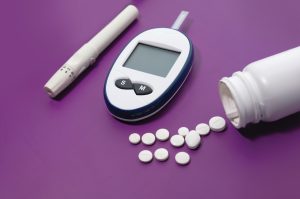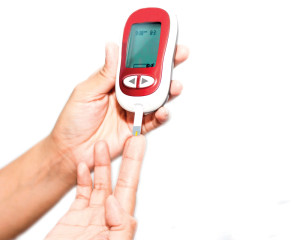Supplements for blood sugar health.
There are some health conditions that are totally out of our control. Take psoriasis, for example. It comes about through a complex autoimmune reaction. It cannot be controlled or lessened via diet and healthy lifestyle.
But, there are other things that are in our control before it gets too late: cholesterol, weight, blood pressure—and blood sugar. Those high numbers can frequently be lowered into healthy ranges without pharmaceutical intervention.
It is helpful to learn and review what factors are impacting the increasing need among consumers in your community for blood sugar support supplements—and the foods and beverages you carry that are much healthier choices than conventional counterparts. There are many potent aspects occurring in the marketplace that can and should deserve to pull a stream of consumers into your stores.
According to Marty Gallant, president and founder with Maryland-based Natural Products Solutions, more than 100 million Americans (one-third of the population) have been diagnosed as either pre-diabetic or with type 2 diabetes. These numbers are rising every year. As such, he said, there are an increasing number of studies on natural ingredients such as vitamin D, magnesium, chromium and cinnamon, for example, to find viable ingestibles to help provide healthier blood sugar profiles in all populations.
Indeed, Max Motyka, consultant for Michigan-based Albion, pointed out that the American Heart Association (AHA) recognizes metabolic syndrome as a significant concern, particularly for people aged 60 and older. Further, research suggests that more than 47 million Americans have metabolic syndrome, a condition that has caused an uptick in type 2 diabetes, pre-diabetes, as well as hypertension and other cardiovascular issues.
Chris Mohr, PhD, RD, Nordic Naturals advisory board member, in California, cited a National Statistics Report (June 2014) by the Centers for Disease Control and Prevention, which stated that more than 29 million Americans, or 9.3 percent of the population, are unable to maintain healthy glucose and insulin levels. “Out of that 29.1 million, eight million were undiagnosed, he said. This same report found that an additional 86 million people had early stages of dysfunction in blood sugar levels; this number is up from 79 million in 2010.”
“Two clear movers impacting consumer’s needs for healthy blood sugar support are seen in two frightening statistical trends,” related Mark Kaylor, founder of Georgia-based Radiant Health Project. “First, the projections that the treatment of diabetes alone by the year 2050 will be larger than the GNP (gross national product) as a whole. The second equally disturbing stat is the obesity rates that have climbed for years. This is especially true for kids today who have a clinical obesity rate hovering around 33 percent. The very thought that one-third of children today are clinically obese is something that should wake every one of us up, including the politicians as we go into an election year,” he said.
Annie Eng, CEO of HP Ingredients in Florida, pointed to obesity and overweight issues as major health concerns to developed countries and developing nations adopting more affluent lifestyles. Overall health and quality of life are compromised by increased cholesterol levels (hypercholesterolemia), increased triglycerides (hyperlipidemia) and high blood glucose levels (hyperglycemia), as a result of sedentary lifestyles and poor dietary habits and choices.
She explained, “Atherosclerotic vascular disease (AVD) is the leading cause of death in developed countries. It’s a well-established fact that the abundance of sugar and fat in our diets is the most important risk factor in developing AVD. Excessive fat and sugar consumption linked to genetic predisposition and poor lifestyle behaviors may lead to a pathological state, called metabolic syndrome.
Perhaps this can also be attributed to the fact that consumers are eating up to 150 pounds per person per year of added sugars, pointed out Carolyn Dean, MD, ND, advisory board member of the Nutritional Magnesium Association. Such extreme and constant levels of added sugars stress the pancreas that makes insulin and the cell membranes that allow glucose into the cells. “At any one time, there are only 2 teaspoons of sugar in the blood stream. A sudden surge of 10 teaspoons into the bloodstream is a shock to the body and sets up an extra surge of insulin from the pancreas, which can cause the cell membranes to become resistant to the constant barrage, setting the body up for type 2 diabetes,” she noted.
Also impacting this sector are certain misperceptions that remain held by too many consumers. Kaylor said that most individuals associate blood sugar problems only and immediately with diabetes, yet “we now know that imbalanced blood sugar levels are a leading contributor to aging, dementia, immune issues, inflammation, eyesight problems, free radical damage and more.” As such, Kaylor sees the urgent need for industry to step up consumer communications explaining how food—and nutraceuticals—impact insulin release and blood sugar, and how when those are impaired, they will stress and impair the cardiovascular system, mood, vitality, kidney health and general health.
In the viewpoint of James B. LaValle, RPh, CCN, one of the lesser-known problems that come with insulin resistance and diabetes is increased risk of fatty liver, “and I am personally seeing this more and more in practice. Fatty liver causes damage in the liver and can lead to liver failure. I still think a lot of people do not realize that insulin resistance is the primary reason for high blood pressure changes, and high triglycerides and elevated cholesterol. In addition, I think a lot of people don’t know that diabetes is the No. 1 cause of kidney failure.”
“Stable” Nutraceuticals
Researchers are beginning to understand more in depth how a variety of naturally occurring ingredients may positively impact healthy blood sugar response. Now more than ever, the products they contain can be merchandized, promoted and sold with complete trust in efficacy that can easily be translated to the consumer. Motyka said, “It is apparent from the clinical research to date that there is a micronutrient component to the epidemic of metabolic syndrome. There have been several micronutrients that have been linked to this devastating syndrome. Calcium, magnesium, zinc, chromium, and even potassium have all been examined. However, as more research is done, certain minerals are rising to the top of the list of possible adjuncts in the treatment of metabolic syndrome.”
Specifically, Motyka explained, magnesium has potent roles in carbohydrate metabolism and decreasing serum lipids, impacting blood sugar response, and he noted that more Americans have at least a marginal magnesium deficiency. Summarizing research from Milagros Huerta, MD, he said, “magnesium deficiency in obese children is associated with the development of insulin resistance, a deficiency they found to be the result of decreased dietary intake of magnesium. Huerta stated that magnesium is associated with insulin resistance and increased risk for type-2 diabetes in adults. Magnes-ium is an important cofactor for enzymes involved in carbohydrate metabolism.”
Dean agreed, adding, “A sign of diabetes is low blood levels of magnesium. Magnesium is the basic nutrient that helps metabolize sugar, assists the pancreas in producing more insulin and helps open the cell membranes to glucose.”
Zinc, Motyka continued, has been shown to help thwart insulin insensitivity, and those with diabetes have a difficulty in zinc absorption and utilization and therefore require higher doses. Zinc has been seen to help glycemic control as well as lower blood pressure and low-density lipoprotein in type 2 diabetics. At the University of Michigan, they have reported that in type-2 diabetics, there is a protein called amylin that behaves inappropriately in diabetics, and it forms dense clumps that shut down insulin producing cells, which wreaks havoc on blood sugar control. Zinc has an ability to prevent this amylin malfunction. Zinc is also needed for production of insulin in pancreatic beta cells.
Recent research, he added, showed that chronic low magnesium and zinc levels relate to low-grade inflammation, which also plays a role in metabolic syndrome. “Magnesium and zinc are catalysts for delta-5 and delta-6 desaturases—enzymes that help convert essential fatty acid in the anti-inflammatory prostaglandins,” he explained. Albion specializes in supplying brand marketers with highly bioavailable forms of several key minerals that are associated with supporting blood sugar health and metabolic syndrome—magnesium, zinc, chromium, and vanadium.
Mohr said he is excited about the newer research showing the positive impact of omega-3s in supporting healthy insulin and glucose levels. “Further, with the inability to control healthy blood sugar levels being one of the leading causes of cardiovascular health issues, the well-known heart health benefits of omega-3 fats make them a wise choice for anyone with blood sugar issues,” he noted.
ALA is also a strong contender in the EFA-blood sugar health relationship especially as an adjunct, Mohr added. Some research has shown that ALA can help support peripheral nerve health, making it useful for anyone who struggles to maintain healthy blood sugar levels.
Bergamot polyphenolic fractions found in HP Ingredients’ Bergamonte activates AMP kinase (AMPK), which plays a central role in regulating glucose metabolism and energy production in several different organs, working as a sensor of AMP/ATP levels. AMPK prevents the accumulation of fat, blocks the rate-limiting step in fatty acid synthesis, and augments fatty acid oxidation. AMPK activation increases intracellular glucose uptake, which leads to the activation of the glucose transporter GLUT1 in all cells and translocation GLUT4 to the muscle cells.
HP Ingredients, Eng reported, has three published human clinicals on Bergamonte showing significant improvements not only in blood sugar response levels, but related cardio metabolic activity as well, such as cholesterol and triglyceride levels. The most recent study, published in Advances in Biological Chemistry, April 2014, 107 individuals with metabolic syndrome received either placebo or 650 mg of Bergamonte twice daily for 120 days. The Bergamonte group showed significant reduction in fasting plasma glucose of 17 percent, serum LDL-C and triglycerides, and increase in HDL-C. Moreover, a significant reduction of small dense LDL particles and reduction in ultrasonographic and metabolic biomarkers of NAFLD suggests a potential preventive role of bergamot derivatives in reducing cardio metabolic risk.
For LaValle, “Phase 2 white bean extract is on the top of my list for natural products that can help people to manage their intake of high-glycemic-load foods. Repeatedly we see in practice that lower carb diets can help with weight loss and blood sugar disturbances.” The problem, he said, is that most people cannot maintain a low-carb diet. This can be due to stress and sleep disturbances that cause increased cravings and hunger, and other causes that basically make you more inefficient at making energy. When you become less efficient, your body calls for more fuel (food). Phase 2 white bean extract blocks carbohydrate absorption without losing the absorption of other nutrients from food. This has several benefits; first it lowers the glycemic burden of carbohydrates by about 60 percent. That means less blood glucose spike after meals, less insulin release and less vascular damage. Secondly, because the starch does not break down, it is delivered to the lower intestine where it feeds the beneficial bacteria. When gut flora obtain enough nutrients, they are able to promote production of gut hormones that regulate appetite, satiety and glucose control.
A Sweet Shelf
When reviewing your blood sugar health supplement inventory, the following may be of interest. Oh, and never forget to remind customers to select no-sugar-added foods and beverages, plus whole grain options, and of course, organic and non-GMO (genetically modified organism) produce!
VirMax from Natural Products Solutions, is a potent multi-ingredient formula, whose nutraceuticals are all shown by research to exert positive influence for healthy blood sugar response. These nutraceuticals include vitamin D, magnesium, bitter melon, chromium, goldenseal, cinnamon bark extract, turmeric, green coffee bean extract and caffeic acid.
Natural Calm from Texas-based Natural Vitality, said Andreas Koch, vice president of marketing, restores a healthy magnesium level and balances calcium intake. The highly absorbable, water-soluble ionic formula is the best-selling magnesium supplement for nine straight years and a multi-award winner. Natural Calm is available in various delicious organic flavors in both 8-oz. and 16-oz. sizes.
Nordic Naturals’ Omega Blood Sugar combines high quality omega-3 fats (455 mg EPA + 315 mg DHA) with 200 micrograms of chromium nicotinate glycinate and 300 mg of alpha lipoic acid.
Maitake SX-Fraction from Mushroom Wisdom Inc., East Rutherford, NJ, said Kaylor, has been clinically studied to benefit blood sugar levels at a highly important level—cellular sensitivity to insulin. “By improving the cells’ response to insulin you are getting at a root cause of much of the imbalance,” he explained. As cells become more responsive to insulin the pancreas does not need to over-secrete insulin, the cells take up more blood sugar and burn it as fuel, and less sugar is left in circulation to turn to body fat. The bonus here is that one usually sees corresponding benefits to the cardiovascular system, including improvements in cholesterol levels and type, blood pressure, and triglycerides (a leading predictor of not only heart disease but mortality as well).” VR
For More Information:
Albion Minerals, (586) 899-7629
HP Ingredients, (877) 437-2234
Mushroom Wisdom, Inc., (800) 747-7418
Natural Products Solutions, (410) 998-9011
Natural Vitality, (800) 446-7462
Nordic Naturals, (800) 662-2544
Pharmachem Laboratories, (800) 526-0609
Radiant Health Project, (678) 310-0862




![[Sponsored Video] Special Report: Bergamonte®, the Untold Story](https://vitaminretailer.com/wp-content/uploads/2023/06/sponsored-video-special-report-b-300x169-1707947265.jpg)
![[Extra! Extra!] Talking Heart Health With Carl Germano CNS, CDN](https://vitaminretailer.com/wp-content/uploads/2024/01/Heart-Health-300x200.jpg)







